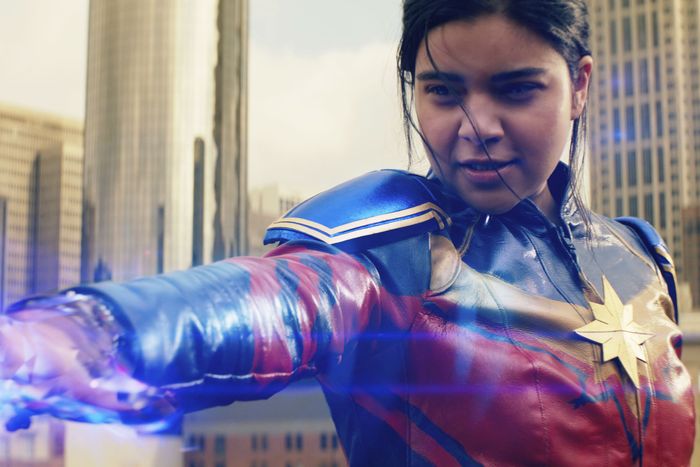
What wave of capitalism is it when the Marvel Cinematic Universe (MCU) has gotten so big that its latest content is about worshiping itself? (Economists, assemble!) And how much of a pleasant surprise is it that Ms. Marvel, despite being a product shaped by that self-adoration, is actually a pretty good time? Very!
Premiering June 8, Disney+’s six-episode miniseries about Kamala Khan (Iman Vellani), a Pakistani American Muslim teenager who discovers she has superpowers, is an exuberant and vivid reminder that once upon a time, before these stories became the monoculture, they were primarily for adolescents. It has been a long time since the MCU had a proper coming-of-age tale — as soon as Tom Holland’s Spider-Man met Robert Downey Jr.’s Iron Man, his youth was over — but in the two episodes provided for review, that’s exactly what Ms. Marvel seems to be. Driver’s-license tests, college applications, first crushes: The high-school-set high jinks are so far a refreshing return to small-scale storytelling, and an exuberant production design that incorporates daydreams during class and doodles in notebook margins invigorates the series’ visual tableaux. Is it odd that these high-schoolers only reference other Disney IP, like Darth Vader and Mulan? Sure. But there’s an enthusiasm to Ms. Marvel that feels genuine, easily sold by Vellani’s winning half-grin.
Vellani’s rebellious, goofy, nerdy, and loyal Kamala shares a bit of DNA with the observant Cher from Clueless, the imaginative Tina Belcher from Bob’s Burgers, the emotive Mei Lee from Turning Red, and, most importantly, the determined Jess from Bend It Like Beckham. Gurinder Chadha’s 2002 film about a British Indian teenager who dares to tell her conservative parents her dreams of playing professional soccer serves as a kind of blueprint for Ms. Marvel: A young woman grows up in an immigrant family with parents who worry that she’ll lose herself to assimilation, encounters ignorance from those who see her as other, and wonders how she can balance her religious beliefs and cultural traditions with her ambition and independence. (Is Kamala Khan a model minority? Discuss.)
That’s all in Ms. Marvel, but so too is the self-assured stuff that made Bend It Like Beckham so unapologetic: Kamala never doubts her parents’ love, never falters in her Muslim faith, and never diminishes her affection for South Asian pop culture, like Bollywood cinema or the Swet Shop Boys. Kamala is on a hero’s journey, but her strengths are not in question (even if the changes to her superpowers might irritate some die-hard fans of the comic-book character, created by editors Sana Amanat and Stephen Wacker and writer G. Willow Wilson). And while the limits of representation have been well discussed by this point, it’s obvious that the team behind Ms. Marvel — including creator and head writer Bisha K. Ali and directors Adil El Arbi and Bilall Fallah — incorporated their ethnic and religious backgrounds into the material with intentionality and pride. (Moon Knight benefited from this too.) The dialogue is snappy without being irritating and tonally acute enough that jokes about Halal Guys upcharging for its sauces and the FBI monitoring mosques both land, although they’re different kinds of grim.
Ms. Marvel is set in Jersey City, where Kamala lives with her chummy father, Yusuf (Mohan Kapur, adorable), her stricter mother, Muneeba (Zenobia Shroff, formidable), and her rule-following older brother, Aamir (Saagar Shaikh), and attends Coles Academic High School with her friends Bruno (Matt Lintz) and Nakia (Yasmeen Fletcher). Kamala is obsessed with Captain Marvel and the Avengers, using detailed, elaborate cutouts to make stop-motion videos about them, and her family and teachers are beginning to worry about her “doodling all day, staring off into space, in your little fantasy land,” as her guidance counselor (Jordan Firstman) puts it. But reality — where Kamala isn’t popular, where her parents rarely let her do any “normal” teen things, and where she’s frustrated by the unequal way she’s treated both inside and outside of her community — isn’t entirely cutting it.
Until Kamala unexpectedly develops superpowers that allow her to generate cosmic energy (read: glowing force-field-like things) out of thin air. Where is this purple, fractal-looking stuff coming from? Does it have anything to do with her mother’s mysterious grandmother or with the pain and trauma both sides of her family suffered as a result of partition? When one of her parents warns her, “I’ve seen what happens when people get obsessed with their fantasies,” what’s that all about? We’ve watched nearly every single MCU protagonist struggle with their new abilities and what it means to be a hero, and Ms. Marvel is no different in that respect. But the series smartly keeps things contained to Kamala’s personal history; to the loop she travels between her home, her school, and her mosque; and to the friction between her maybe-more friendship with Bruno and her crush on new student Kamran (Rish Shah, who gets a standout moment related to The Great British Bake Off). The relationship between Kamala and her parents, in particular the stern Muneeba — who is well encapsulated by Shroff’s deadpan delivery of “You want to go to a party at night. Is this a joke?” — feels fully realized. The MCU framework is a rigid one, but within it, Ms. Marvel, with its evil-eye pendants, Zamzam soda, and gaggle of gossiping aunties, is infectious.
That intimacy is an asset, and Ms. Marvel would be smart to stay this tightly focused as it continues. A Captain Marvel appearance is probably a guarantee in this show, but can it be for a reason other than an apocalypse? Not every MCU narrative needs to be about saving the world. Growing into yourself is a worthy story too, and so far Ms. Marvel is giving Kamala Khan the space she needs to do just that.
More TV Reviws
- Meghan Markle Pioneers New Frontiers in Unrelatability
- Marvel Won’t Let Daredevil: Born Again Live
- We Were Too Hard on Winning Time


